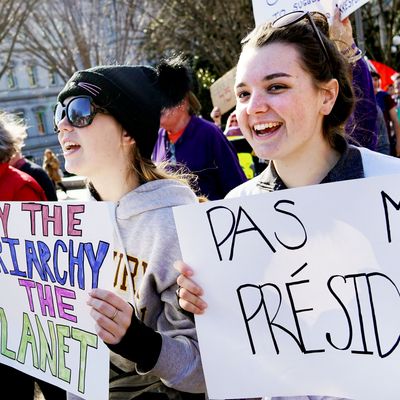
Even as the political world continues to debate the effects of the millennial generation (those Americans born, depending on the definition, between 1981 or 1982 and 1997 or 2000), there’s a new reality just on the horizon, which the debate on guns after the Parkland massacre has accelerated: the post-millennial generation, that more clearly 21st-century cohort (sometimes called Generation Z) that is just now beginning to make its way onto the voting rolls.
We’ve all seen the high-school kids protesting both gun violence and the pols who are in thrall to the gun lobby. But there’s less-anecdotal data becoming available about the attitudes of the post-millennials, as reported by Ron Brownstein. And it sure looks dangerous for the future of Trump-style politics, or perhaps Republican politics generally.
Basically, everything about the millennial generation that threatens the GOP — its diversity, tolerance, and relative disdain for values rooted in conservative Christianity — is even more likely to be manifested among the post-millennials.
“It’s difficult to see how the GOP will gain ground among younger adults as this newest cohort continues its demographic and cultural drift away from the average GOP voter,” says Daniel Cox, research director of the nonpartisan Public Religion Research Institute, which recently conducted one of the most extensive surveys of attitudes among post-millennials in partnership with MTV. “The cultural disconnect is only going to grow. The average GOP voter is a middle-aged white Christian. That’s simply not what the US is going to look like in the future.”
For one thing, the post-millennials are roughly half nonwhite. “Already … a majority of post-millennials are kids of color in 13 states and 38 of the 100 largest metropolitan areas, ranging from Los Angeles, San Antonio and Houston to New York, Chicago and Memphis.” That trend is likely to intensify. And while it’s a bit early to nail down specific political leanings in kids this young, a survey of students entering college in 2016 is illustrative of what we are likely to see, says Brownstein:
In that poll, 80% of the entering students said the federal government should address climate change, 71% said the wealthy should pay higher taxes and 68% said gun control laws should be more strict — all priorities that Trump and congressional Republicans reject.
Also in the survey, 36% of the entering students identified themselves as “far left” or “liberal.” That was a significant increase from the 24% that so identified in 1997, around the time the first millennials entered college … Among entering women, the study found, over 41% in the new poll identified as liberal or far left, the highest number recorded since the survey began in 1966.
There are some signs of hope for Republicans among post-millennials, as some findings from a different survey of 15–24-year-olds (basically younger millennials and post-millennials) by the Public Religion Research Institute and MTV show:
White young people (35%) hold more favorable views of Trump than Hispanic (17%), API (6%), and black young people (5%). However, young white people are less favorably inclined towards Trump than white Americans overall; 46% of white Americans view Trump favorably.
More importantly, the demographics of these young people make pro-Trump pockets less important:
Seventy percent of young people view former president Barack Obama favorably, while 28% have an unfavorable opinion of him. In sharp contrast, only 25% of young people view Donald Trump positively, while 72% have an unfavorable view of him.
It’s possible, of course, that economic conditions or some dramatic international development could change all of these numbers. Certainly, there’s a decent chance that post-millennials could enter the workforce with better prospects than the younger millennials whose first search for jobs as debt-laden ex-students were dampened by the Great Recession. It once looked like the baby-boom generation might be a big liberal force in politics for decades; it didn’t quite turn out like that. And the political implications of perhaps the most striking feature of post-millennial life, a complete immersion in digital technology and social media, are not always easy to discern.
But demographics alone, compounded by a decline in conservative religious views that first became so notable among millennials (one expert calls the post-millennials the “first post-Christian” generation), should make this new cohort of citizens problematic for any political party that relies on white identity politics and a firm belief in rigid and often patriarchal norms of sexual behavior. And like the millennials, the post-millennials are a large generation. If the GOP gets on the wrong side of it, there could be political hell to pay for a long time.






























